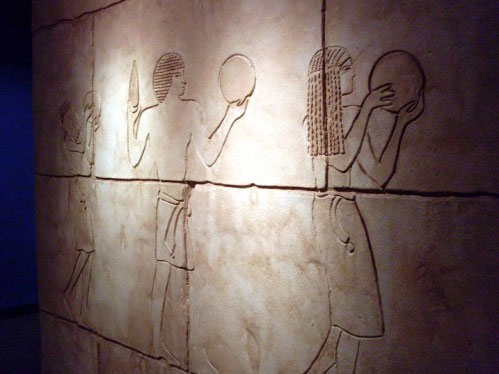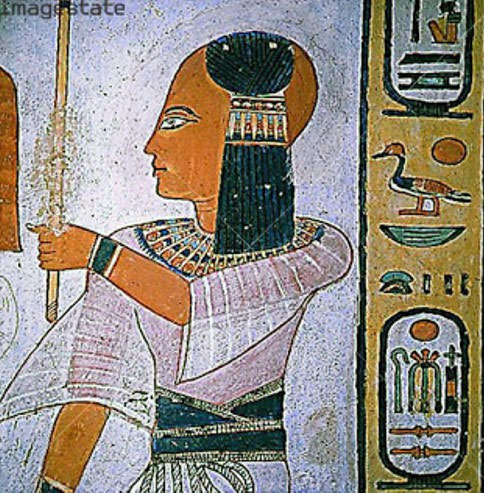10 interesting inventions of ancient Egyptians (II)
In the previous article, the writer provided you with the great inventions of the ancient Egyptians. And here are 5 interesting inventions left in the list.
>>>10 great inventions of ancient Egyptians (I)
5. Peppermint candy

We should thank the ancient Egyptians for their solutions to eliminate mouth odor. Like modern times, ancient Egyptians considered bad breath as a symptom of poor dental health. Unlike us, the Egyptians do not use drinks and foods that are high in sugar, but use stone utensils to grind flour to make bread that makes sand and debris exist in food. day. As a result, their enamel gradually deteriorates and increases the risk of dental diseases.
The Egyptians were quite good at medicine, but they did not have an oral specialist. Those who unfortunately suffer from dental disease have the only way to suffer. Scientists who unearthed the mummy have found deep teeth and evidence of festering in the gums. In response to unpleasant odors from dental diseases, the Egyptians invented the first peppermint candy, by combining incense, aromatherapy and cinnamon to boil with honey and then back into the small Beeds.
4. Bowling

In the settlement of Narmoutheos, formed during the Roman period and occupied Egypt in the second and third centuries AD, 56 miles (90km) south of Cairo, archaeologists discovered a The room contains many lanes and many balls of different sizes. This lane is about 3.9m long, 20cm wide and 9.6cm deep with a square of size 12cm in the center.
Unlike the modern bowling alley, the Egyptians aim at the holes in the middle of the lane. The player stands at opposite ends of the lane and tries to throw the ball into the center hole and at the same time makes the opponent's ball go astray.
3. Cut hair and shave face

Perhaps the Egyptians were the first ancient people to feel trouble with their hair. They considered a messy haircut that was unhygienic, because the sweltering heat of their homeland made it difficult to leave long hair and a thick beard. So they often cut their hair and shaved their face. Monks are special people who do not like to have dense hair. Their habit is to shave their entire body every 3 days. In ancient Egyptian society, smooth whiskers were considered polite and 'trendy' while people with stubble hair were considered to be inferior in society.
The Egyptians invented items that could be used for shaving, initially with a sharp set of stone blades fitted with wooden handles, and then replaced with brass razors. They are also the first to practice hair cutting. The first barbers came to cut the wealthy aristocrats, but then formed a cutting trend for other middle-class customers outside, just below the shady trees.

But the strange thing is, even though they don't want to wear shaggy hair, they still want to leave some hair on their faces. The Egyptians used wool to weave into hair and fake beards. Even the kings and queens of Egypt also wear these beard wigs. The fake beard has different shapes, to show the dignity and social position of the wearer. Ordinary people wear a fake beard of less than 5cm in length, while the king wears a fake beard which is long and carefully trimmed at the end.
2. Lock the door

Did you know that today's door locks have been around for thousands of years? It was the Egyptians who created the door around 4000 BC. Basically this is a latched cylinder, which means that the lock consists of a concave shaft connected to different lengths (pins) that can be manipulated by inserting the key. When inserting the appropriate key into the drive, the keys on the key push the battery bars up so that the batteries will exit the lock shaft. At this point, we can rotate the lock shaft and unlock it.
One drawback of these ancient locks is their size. The largest one is up to 0.6m long. The Egyptian lock was actually safer than the spring technology to keep the lock shaft developed later by the Romans. The Roman locks were hidden inside the door, but easier to open than the Egyptian locks.
1. Toothpaste
As mentioned earlier, the Egyptians had many problems with their oral health, because their bread had stones and sand in it, causing the enamel to erode gradually. The only way they can do it is to keep their teeth clean because in their day, there was no dentist. Archaeologists have found toothpick buried with mummies, so that the dead can clean food debris stuck in the teeth when they are in the afterlife. Along with Babylon, they also had the opportunity to invent the first toothbrush.

However, the Egyptians also contributed another great invention to protect their teeth, which is toothpaste. The first recipe includes flour of cow's nails, ash, burnt eggshell and powdered ice. Archaeologists also found a more advanced toothpaste recipe recorded on the fourth century papyrus, the Roman era occupied Egypt. However, this note does not explain the exact blend content of rock salt, mint, dried iris and ground pepper, to create a "perfect white and fine powder" mixture .
- 6 things we do not know about the people of ancient Egypt
- 15 quirky inventions but the idea is quite interesting
- Interesting inventions in 2005
- 9 ancient inventions ahead of the age of 1000 years
- Discover typical dishes of ancient Egypt
- Why do ancient Egyptians only sex in the summer?
- Ancient Egyptians were good seafarers
- Revealing the
- Raw materials for blue ink production of ancient Egypt
- Why did the ancient Egyptians worship lotus images?
- Cruel punishments of ancient Egyptians
- What animals did the ancient Egyptians worship?
 Daily use inventions come from universities
Daily use inventions come from universities Special weight loss device helps prevent appetite
Special weight loss device helps prevent appetite 8 inventors were killed by their own inventions
8 inventors were killed by their own inventions Iran invented a motor car powered by water
Iran invented a motor car powered by water